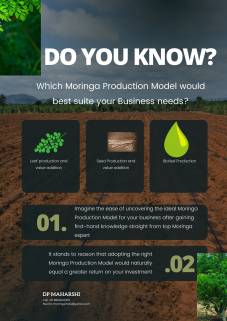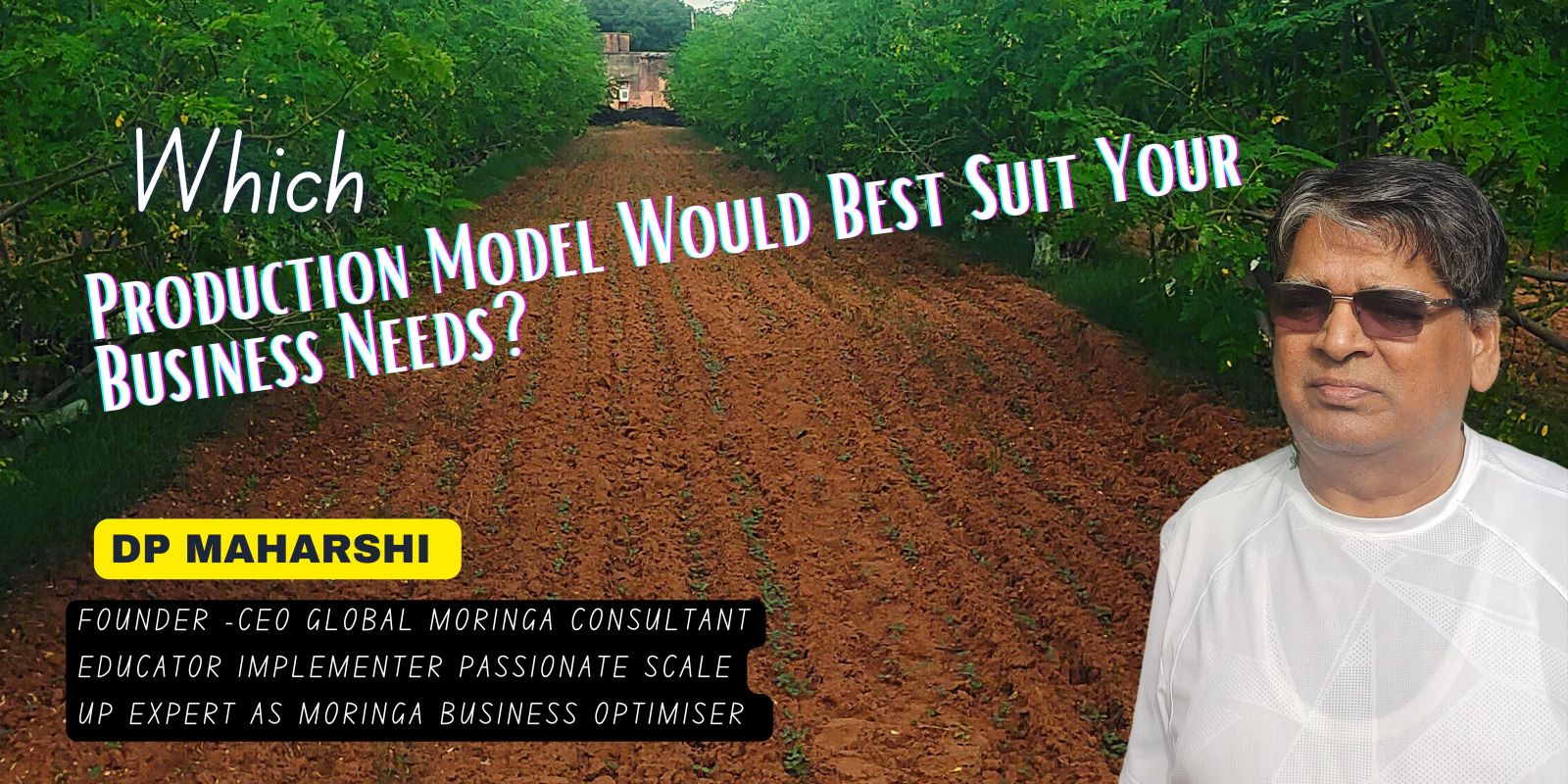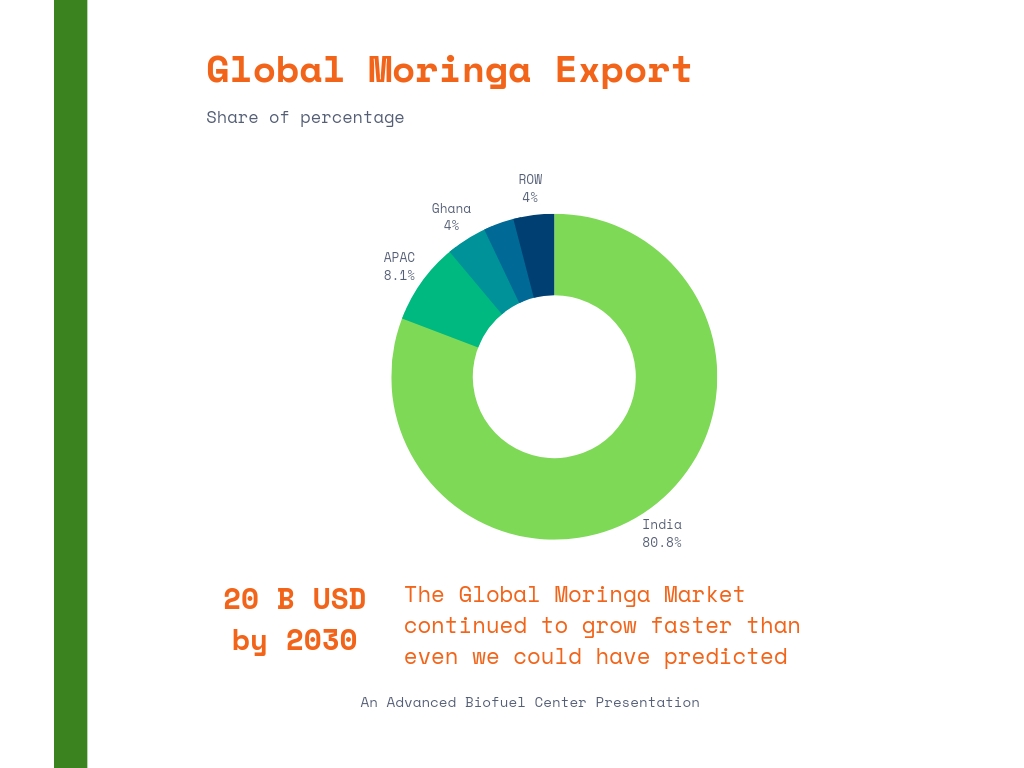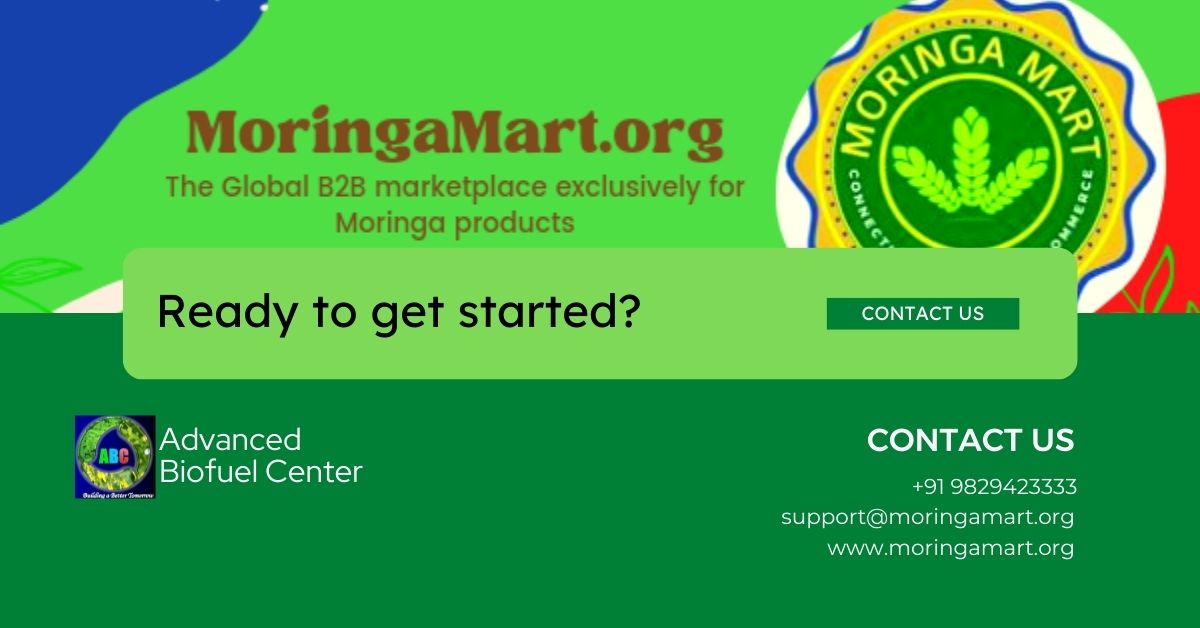

 Global Moringa business has evolved into a highly diverse sector, with operations that range from small subsistence farms to large multinational holdings. Farmers’ products are sold fresh in local markets, but also across the Roundtable through sophisticated and modern value chains. Beyond the Moringa's traditional role in folk food and medicines now it has gained the status of superfood and health supplements and also biofuel feedstock.
Global Moringa business has evolved into a highly diverse sector, with operations that range from small subsistence farms to large multinational holdings. Farmers’ products are sold fresh in local markets, but also across the Roundtable through sophisticated and modern value chains. Beyond the Moringa's traditional role in folk food and medicines now it has gained the status of superfood and health supplements and also biofuel feedstock.
India based Advanced Biofuel Center (ABC) has been working on Moringa since last decade with a focus on understanding the unique properties of the plant that can be manipulated to coax it to reach its fullest potential addressing horticultural practices, agronomics and sustainability issues.
Moringa trees, from which Moringa Products are produced, are originated from India, and now found in African, Asian, and American countries such as Ghana, Philippines, and Haiti. These Products are commercially manufactured by processing different parts of Moringa such as leaves, Seeds and other parts. Common uses of Moringa Products are in Food & Health supplement, pharmaceuticals, cooking, and cosmetics. The different product types of Moringa Products are virgin Moringa Products, organic Moringa Products and other miscellaneous, depending on the method of growing, harvesting and processing/extraction.
The increasing demand for Moringa Products in developing countries like India, China and Brazil is one of the primary drivers. This is owing to the strong economic growth and increasing awareness of health benefits among consumers, coupled with a greater exposure to the western lifestyle, there seems to be an upward trend in consumption of Moringa Products. About Moringa Market

What types of Moringa food and health supplements are people buying, and why?
Moringa market has gained more exposure owing to rising awareness and concern among consumers regarding health benefits. And Covid-19 crisis has given boost to moringa industry for health enhancement and economic empowerment. The Moringa is all set to help in achieving Sustainable Development Goals, Goal 1. End poverty in all its forms everywhere, Goal 2. End hunger achieve food security and improved nutrition and promote sustainable agriculture and Goal 3. Ensure healthy lives and promote well-being for all at all ages by 2030.
People continue to reach for more moringa products than ever before. Looking at Immunity/Sports/Energy/Weight/ Diabetes/healthy aging/Mood & brain health etc., we now see the growth that the 2+ year of COVID-19 pandemic has taken the moringa market to more than $10 billion - a market about $1.5 billion larger than 2020.
The consumers are now more aware of the ingredients in the products they put on and, in their bodies, but also of the social and environmental impacts of companies that manufacture those products.
Moringa project developers/entrepreneurs who want to have a slice of the 10- 20 billion USD market must adopt and implement appropriate Moringa production strategies that will lead to improved Yields as well as better quality performance. Consistency is important for long term farm profitability and that can be ensured only with enhanced Moringa cultivars and advanced agronomy
While this growth is of course welcome to Moringa producers, it carries challenges. How do producers increase their yield while keeping costs under control and still ensuring top quality product? What about increasingly erratic global weather patterns?
As the saying goes, ‘necessity is the mother of invention’ and the Moringa industry is certainly tackling the challenges it faces with some exciting innovation.
As you are probably aware, for your Moringa project(s) to succeed it is imperative to discover the right Moringa production model for your unique business needs. I know this is easier said than done as deciding on which model to adopt is tied to a variety of seed selection, land identification, agro-climatic, social, economic, legal and geographical factors.
Traditional Moringa farming methods are no longer enough for today’s farmers. To be competitive today, Moringa growers need more from their land and their crop. Higher levels of production require more intensive farming, but traditional methods are very difficult to scale cost-effectively and sustainably.
In order to be competitive, Moringa producers are increasingly adopting the first and second model, having identified a pressing need for both a scientific approach to planting and semi-automated management. With seeds, support and services of ABC, growers are creating/ extending their Moringa acres and business in a very organised way, and finding new uses for technology. The growers are also looking at different varieties of Moringa tree that could potentially deliver a greater yield. However, there may be implications with these varieties, such as the amount of water required to grow them, which also have to be taken into account.
Project management is a science - it is not as easy as "just setting a deadline". Many social, technical, and collectively concepts impact your projects. Knowing about those is a first step on the path to success. Let us start working on your prestigious project with acquiring the right planting seeds, from right source, in right quantity.
The seed is the first determinant of the future moringa plantation development. The seed is the master key to success with the cultivation Quality in production is at the root of your success.
The Knowledge will help not only to maximize yields, but also improve the management and sustainability of natural resources.
We deliver knowledge, insight, transparency, and efficiency as Moringa production needs innovation for better solutions with better inputs (technology, information, fertilizers, seeds, and crop management). To provide solutions for this highly specialized sector, we have developed a unique and comprehensive package of top variety seeds and services for the benefit of Moringa grower/project developers
In times of uncertainty, it is important to build more consistency in to Moringa production systems. You can reach at higher yields with improved seeds unveiled by ABC and with an integrated approach to growing purposeful Moringa, focusing on getting the basics right and using the unmatched enhanced agronomy as developed by ABC to make better decisions about production strategies.
Seed Variety Selection
You can reach at higher yields with improved seeds unveiled by ABC and with an integrated approach to growing purposeful Moringa, focusing on getting the basics right and using the unmatched enhanced agronomy as developed by ABC
The aim is to optimise yield through a clear understanding of planting seeds and planting soils, using the best practices in combination with crop protection and nutrition strategy.
Yield starts with the genetic potential of the variety. It is essential to choose the right variety for your project type.
Sustainability takes centre stage
 Optimizing production begins with elite genetics, follows by enhanced agronomy practices. Mastering the art of the science, we have not only introduced different cultivar for Moringa cultivation for leaves and Moringa plantation for oil, but also have laid down Design Principles for a Profitable, Productive, & Sustainable Moringa Farm for production of Leaves/Seeds
Optimizing production begins with elite genetics, follows by enhanced agronomy practices. Mastering the art of the science, we have not only introduced different cultivar for Moringa cultivation for leaves and Moringa plantation for oil, but also have laid down Design Principles for a Profitable, Productive, & Sustainable Moringa Farm for production of Leaves/Seeds
As a prospective Moringa project developer/entrepreneur, you have tremendous opportunities ahead of you. But with challenges. Challenge to perform, challenge to succeed, challenge to sustain. And to meet out all challenges you just need our seeds, unmatched varieties, unbeatable yields backed by unparalleled expertise.
Implementing appropriate Moringa production strategies will lead to improved yields as well as better quality performance.
Increasing yield, while improving quality and driving down production costs. We are here to empower cultivators worldwide to develop moringa plantation, increasing their yields and quality while achieving new margins and profits
Consistency is important for long term farm profitability. Take an integrated approach with careful attention to detail and expert advice
Profitability is coming from productivity, efficiency, management, austerity, and the way to manage the business.
The aim is to optimise yield through a clear understanding of planting seeds and planting soils, using the best practices in combination with crop protection and nutrition strategy.
Yield starts with the genetic potential of the variety. It is essential to choose the right variety for your project type.

ABC provides cutting edge advice and tools to Moringa-Entrepreneurs to develop a Moringa business model that "embraces sustainable agriculture and technical, knowledge sharing with grower
To Improve productivity, maximize crop yields/improve farm profitability, manage fertilizer and irrigation application, and keep costs under control you need to acquire or employ best expertise and state-of-the-art Moringa farming technology, you need adequate knowledge and applied crop consulting.
The knowledge will help not only to maximize yields, but also improve the management and sustainability. Knowledge can help you to optimize and improve the quality of harvest and value addition. To enable Moringa project developer to have enhanced knowledge, we have introduced 3 important international programmes on Moringa Production and application
1. Global Moringa Meet: Global Moringa Meet is the premier destination for Moringa growers, producers and professionals interested in the latest Moringa production technology, news, and policy.
2. Moringa Farm Stay (Moringa Farm Internship Program): Moringa Farm Stay (Moringa Farm Internship Program is sort of like a live, interactive slideshow of agriculture making of Moringa from "Soil to Superfood" that touches all the participant's senses.
3. Consult with experts: online/ Mobile consultancy for setting Moringa Projects
Every part of the tree – leaves, seeds, flowers, pods is utilized as food, while stems, roots, bark, and gum are used for the manufacturing of medicines, which in turn, makes the entire tree usable. As a result, the global Moringa market is anticipated to gravitate towards an impressive valuation.
An under explored revenue stream for Moringa is the utilization of the byproducts and the rest of the plant. The nutritious Moringa leaf leftover, power residues, pod shell, seeds hull to be used in best manner. The trees store carbon and are transformed into electricity at the end of their lives, the shells become livestock bedding, and the hulls are used as dairy feed. Nothing goes to waste. The seedcake shows reasonable biogas yields and is often abundantly available at low cost. The return from biogas can in some cases be much higher than the income from the biofuel produced from Moringa. Press cake has got tremendous uses which has amazing profitability.
The Moringa farmers and processors have always taken responsibility for these coproducts—the leaf-residues, powder-residues, hulls, shells, and press cakes—getting the most out of the resources used to grow Moringa and ensuring they are put to beneficial use rather than sent to landfill.
With changing markets for these materials, we at ABC are spurring innovation for higher value and more sustainable uses. In fact, by 2025, we commit to achieve zero waste in our plantation by putting everything we grow to optimal use. Given that Moringa coproducts are widely utilized already, progress toward this goal focuses on reducing our environmental footprint and adding value economically and environmentally.
Moringa capture and store a significant amount of carbon over its life cycle, and using the trees’ hulls, shells and woody biomass is key to reducing carbon emissions and environmental impact. One ha Moringa plantation offset 30 tons of CO2. 1,000 litres of biodiesel production from the Moringa Oleifera seeds would be -14,188 kg of CO2 equivalent. Considering the inherent properties of trees and traditional uses of Moringa coproducts, current Moringa farming practices are offsetting about 90% of their carbon emissions. With further production improvements and policy changes, the Moringa community could eventually be carbon neutral, or even carbon negative.
Global Moringa Marketplace

The Moringa Industry’s Exclusive Marketplace Moringamart.Org Ends Search for Potential Buyers and Retailers Across the Globe
In order to connect our customers with buyers, the concept of moringamart.org was born. We then went onto create a platform connecting the two, Moringa seller and buyer. Moringamart.org was created to bring together suppliers and buyers, so innovative products can not only get on store shelves, but in the hands of eager consumers.
The B2B (business to business) online marketplace moringamart.org is an exclusive platform through which only Moringa sellers, buyers and businesses can communicate information regarding Moringa products and perform transactions in one unified place. It allows sellers to access a larger customer base at a lower cost, whereas buyer can make product discoveries much easier and free of cost.
With the increasing popularity and rising competition, the need to be present on a B2B eCommerce platforms has become inevitable. They play a large role in product discovery when it comes to wholesalers, manufacturers, and distributors, resulting in a highly efficient platform where supply and demand among seller groups can be identified and carried out seamlessly.
The outcome of MoringaMart.org is unmissable: Moringa market with an exclusive platform makes services faster, better, cheaper, and more omnipresent.
When a marketplace like MoringaMart emerges in an industry, evidence to watch out for is as follows: 1) Industry cost curves come down drastically; 2) Speed of sells/service increases; 3) Scale of the market served goes up; 4) Scope of the available products/services increases; 5) The variety of products served goes up.
Moringamart.org is exclusive and the perfect marketplace for Moringa Buyers-seekers everywhere as we bring the Roundtable to you with business and profit. Now you can enjoy an immersive experience of navigating the global landscape of Moringa buyers.
Moringa Production Model Roundtable
The future direction of the industry from a more holistic perspective, looking at issues from the eyes of a project developer and an investor, and touched on: In this insightful analysis on concepts like "pro-poor Moringa" and "smart biofuels" and called on Moringa-Entrepreneurs to develop a Moringa business model that "embraces sustainable agriculture, knowledge sharing with growers and addresses issues of social inclusion, equity and gender at the grassroots, besides addressing climate change.
If you a Moringa Project developer or planning for a large scale Moringa Plantation Project, we are organising live “Moringa Production Model Roundtable” sessions for a group of six people
To help in answering the question, "which Moringa production model would best suite your business needs" register for Moringa Production Model Roundtable to hear the answer right from top Moringa Experts and Educators
There’ll be 6 sessions of 60 minutes each, 2 per week, on Wednesday and Sunday
Session I: Moringa Production Model Roundtable: Preparatory stage (Land identification, feasibility)
Session II: Moringa Production Model Roundtable: Preliminary stage (Business Planning)
Session III : Moringa Production Model Roundtable: Pre-plantation stage ((Farm Designing, Sourcing of elite planting stock and nursery raising)
Session IV: Moringa Production Model Roundtable: Plantation stage (Execution of Plantation)
Session V: Moringa Production Model Roundtable: Post plantation stage (Crop-Care)
Session VI: Moringa Production Model Roundtable: Post Harvest stage (storage etc.)
Session VII: Moringa Production Model Roundtable: OIL EXTRACTION
Session VIII: Moringa Production Model Roundtable: MARKET
All above are must and most 'in-demand' sessions at the Moringa Roundtable Sessions. Simply intensive experience sharing session by top Moringa experts, scientists and practitioners, followed by a lively panel discussion and Q&A.
Do you want to maximize your Moringa output? You're probably thinking, "What Moringa entrepreneur doesn't" right? If so, then you don't want to miss our roundtable discussions with Brightest mind in Moringa
With attendance, you'd be able to listen in as top Moringa growers share their secrets on cultivation and agronomic issues like seed selection and pre-treatment, optimum soil conditions for growing Moringa, fertilization, pest and disease management, pollination, pruning and water/soil/heat/cold tolerance.
Just imagine how your Moringa project(s) would benefit if you were able to question these Moringa experts about their experiences regarding the best practices in planting and maintaining Moringa. By attending the Moringa-Roundtable sessions, you would be granted this exciting opportunity and more!
By attending, you will also listen in as Roundtable-renowned Moringa experts debate and discuss the relative merits, challenges and points for consideration when choosing a centralized production management system versus an out-grower system for Moringa cultivation.
Imagine the ease of uncovering the ideal Moringa production model for your business after gaining first-hand knowledge straight from top Moringa experts themselves. It stands to reason that adopting the right Moringa production model would naturally equal a greater return on your investment!
P.S. Discovering the ideal Moringa production system(s) for your unique business needs is key to maximizing returns on your investment. Book Moringa Roundtable sessions for your experts/executives/field supervisors and listen in as top Moringa project developers share their expertise and insights at the "Production Model Roundtable"
Booking for Moringa Production Model Roundtable (MoringaRoundTable is open
Comment